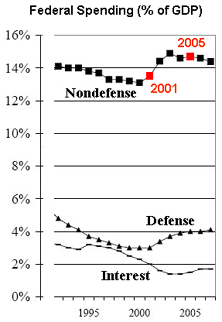BIG SPENDER….National Review editor Rich Lowry addresses the party faithful today about the reason Republicans got trounced so badly this year:
One temptation will be to say that if only Republicans had stayed truer to the faith, especially on fiscal discipline, none of this would have happened. Earmarks unquestionably contributed to the culture of corruption that has so bedeviled Republicans in recent years. But fighting them became an overriding obsession of some conservatives and of McCain, as if opposing earmarks alone — 1 percent of federal spending — would constitute a winning economic agenda.
As for Bush, he didn’t run as a strict fiscal conservative when he was elected in 2000, and he wasn’t any more profligate in his second term, when he was roundly rejected by the public, than in his first term, when he was on his way to reelection.
Lowry is right, but it’s actually even worse than that. Bush’s big spending ways have been overdramatized by the right, but it’s true that domestic spending went up during his first three years in office. So did earmarks. And his big Medicare bill was passed in 2003. Did conservatives revolt over this? It sure doesn’t look like it. The next year Bush rode a triumphant conservative coalition to reelection and Republicans picked up four seats in the Senate.
But then, starting in 2004, Bush got fairly stingy with his domestic budgets. Result: Republicans took a shellacking in 2006, and two years later took yet another shellacking. This is not exactly great evidence for a nationwide rebellion over profligate spending. In fact, you might even conclude that Americans like profligate spending. Conservatives don’t seem to mind it that much either: their rebellion against Bush mostly started after 2005, three years after the 2003 budget was put in place and lower spending had become the order of the day in the Bush White House.
As for earmarks, can we get real here? Lowry is right that they represent a tiny portion of federal spending, but even at that he doesn’t tell the whole story. Earmarks merely redirect spending, they don’t add spending to the budget. If we got rid of earmarks completely, we’d still spend the same amount of money. It would just get allocated a little differently.
Bottom line (so to speak): Reining in spending and cutting back earmarks might be good things to do from a conservative perspective. But was it spending and earmarks that turned the American public against the Republican Party? Not a chance. My guess is that the answer is pretty much the obvious one: a combination of policy incompetence, an unpopular war, economic dogma that didn’t even pretend to take middle class wage stagnation seriously, and an increasingly hard-edged social conservatism that turned off Latinos, seculars, and the young. But big spending? Not so much.


















